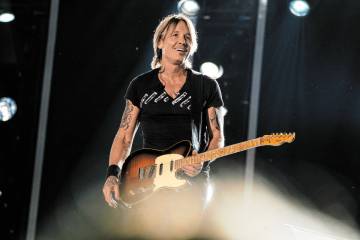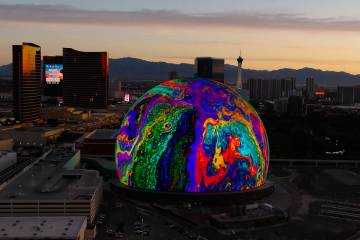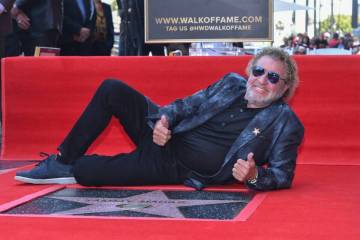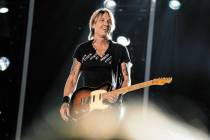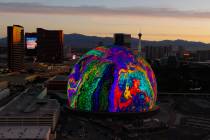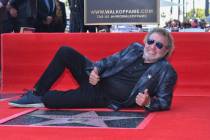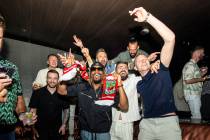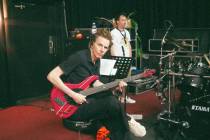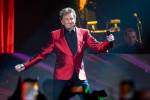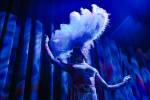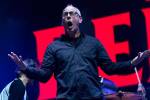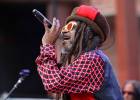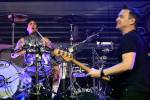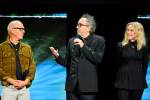Adam Lambert talks about filming a video in Vegas and more
Adam Lambert is every bit as easygoing and engaging in real life as his appearances and interviews suggest he’d be.
We recently caught up with him in advance of his Friday show at The Foundry at the SLS Las Vegas and asked Lambert about the video for “Another Lonely Night,” his most recent link to Las Vegas (his American debut standing in for Freddie Mercury as the frontman of Queen happened here at the MGM Grand Garden during the 2013 iHeartRadio Music Festival), which he shot here last fall.
We previously chatted with the clip’s director, Luke Gilford, who gave us his insight, and this time got to hear Lambert’s perspective.
Lambert also discussed his upcoming role in the “Rocky Horror Picture Show” remake being produced by Fox. If you haven’t already, be sure to check out the full feature profile and also see some excerpts from our recent conversation below.
On shooting the video for “Another Lonely Night” in Las Vegas:
We brainstormed about, like, what can we do with this song to sort of emphasize that feeling of solitude and loneliness, but at the same time, sort of this, like, contradictory sense of presentation and showmanship and love for entertaining. You know, performers, we’re a weird breed of people. We’re complicated, full of contradictions, and I think the video sort of … I don’t know how Luke did it, but I think he did it. He did a great job. And it was exciting to do a nostalgic kind of vibe for a video. You know, I’ve done a lot of videos that are more contemporary. So it was cool to sort of, like, kind of go sort of Elvis, “Leaving Las Vegas,” um, and kind of go there.
On how the video seemed like the antithesis of the typical videos shot in Las Vegas and how it was refreshing that another side of the city was depicted:
Thank you. I was really proud of the video. It was different for me. I also really liked telling more than my own story. That was something that I really wanted to do. I was like, you know, I’m singing. It’s my voice, but let’s show some other examples of this story, of this feeling, and I’m really glad that we did that. We had some incredible talent that we pulled.
Indeed, folks like Gigi Gorgeous. Lambert on how Gigi was cast for the video:
I’ve met GiGi before. I think she ended up at an after-party at my place one night, and I just found her to be so refreshing and so honest about who and what she is. You know, this girl is really impressive and really exciting and stunning. So I was like let’s do something together, and I’m glad we did.
On David Bowie and how he once called him “the bravest artist of the century,” and his expressed admiration for how Bowie handled gender roles and the influence he had:
I definitely think that he was ahead of his time. You know, that’s why it was interesting to see so many artists respond to his death, so many young, contemporary artists beyond that generation. I just think that he wasn’t always doing what was popular, and that takes a lot of guts and a lot of bravery. To me, that’s what he kind of represents, a brave artist that was willing to go against the grain. And I think that inspired a lot of artists to come, but also inspired a lot of regular people, people that might have felt like outsiders. I think he was sort of the icon of the outsider for very many people.
On his first exposure to Bowie and when he first became a fan:
I became more of a fan a little bit later. I definitely was aware of him. My father was a big Bowie fan. I remember him playing the “Diamond Dogs” album for my brother and I. When that “Future Legends” song, the first song on the album was on, it was very scary. My brother would go run and hide, and I thought that was the coolest thing. I thought it was so cool that my father had something that would spook my little brother. And at that point, I was obsessed with Halloween, which actually hasn’t changed. It just felt … it felt … I had fallen in love with Michael Jackson’s “Thriller,” and this, to me, was sort of the twisted cousin to that, you know.
On being involved with Fox’s “Rocky Horror Picture Show” remake:
I’m very excited. I actually recorded the vocals a couple of weeks ago. It was very exciting. It was in Malibu, overlooking the water at Lou Adler’s studio, and Lou Adler was like the original producer of the film. So it’s cool that he’s still involved in this project. I think that will help it maintain a lot of its integrity. And his son, Cisco Adler, produced the music. I’ve been aware of Cisco. He’s been in the scene awhile now, so it was exciting to work with somebody that has family ties to the project and is also a contemporary music producer. He did a lot of cool things with it. I really enjoyed it. They definitely refreshed the sound of everything, but not in a way that takes it too far away from the original, which I think is the perfect balance.
On his personal style, how he developed it, how he first fell in love with music and what music shaped him:
You know when I was a kid, I was kind of an eccentric, hyperactive, creative kid, and my parents figured that the best outlet for me would be, like, a theater group, and that’s what started my love affair of performing, and we were doing musicals. I was listening to soundtracks of musicals and really diving into that whole world and studying. I was such a student of it. You know, I learned every soundtrack recording and score and then started taking voice lessons and really improved my voice.
And when I got into high school, I was doing stuff in high school, as well — choir, jazz band, singing, musical theater — and I knew right away when it came time to graduate what I was going to do next was go into the arts. And so that’s what I did, and, looking back, I probably could’ve moved to New York. It probably would’ve had more to offer me at the time than L.A. did, but for whatever reason, I stayed in L.A. I liked California. I was drawn to it, and I did a lot of theater in L.A., which is kind of an oxymoron; there’s not a lot of theater in L.A., but I did as much as I could. I did a lot of it.
And then I finally got a gig on a Broadway national tour of a musical at about 25, and you know, this was the highest level that I had achieved in the business. I was understudying a lead role. I was in the ensemble. I was thrilled. I was like, ‘I’ve made it. Now maybe I can move to New York, now that I have this credit, and I can continue working and be on Broadway,’ which was my 8-year-old dream for myself.
And very quickly, I realized after being on the road with the show for six months, it just didn’t do it for me. It wasn’t satisfying me creatively. It wasn’t matching what my actual interests were as a creative person. I realized that I had been listening to … up until that point, I had been listening to a lot of ’70s rock, and I had started a band, and then I went and did this and went, ‘I want to be in my band.’
So I quit and I came home and started working on music full time. Then I ran out of money, and I was like, well, I don’t want to get a job in retail again. I’ve done that way too many times, and so I got cast in the Los Angeles production of ‘Wicked,’ the musical. So this was an eight-show-a-week, professional production in L.A., paying very well, enough to make a living off of, unlike most theater in Los Angeles.
And so I did that for two years, and while I was doing that, I worked on my music. Then I auditioned for “Idol,” and they were like, “You’ve got to quit that show,” because you can’t be in a professional anything. So I quit and then “Idol” happened. It was a gamble, because they made me quit before I even got in front of Simon, Paula and Randy and Kara. So it was definitely a gamble. I thought, well, this could be a shot and if I don’t take it, I’m going to kick myself later. And I’m glad it worked out. It’s definitely an example of you’ve got to take the risk in order to get the reward.
And, you know, up until that point, you know, look, I had a background in theater, I took voice lessons — one time as a teenager, I took opera for a little while — but I was obsessed with pop music when I was a teenager as well. That was the late ’90s, so it was like the, you know, all the Christina and Britney and Nsync and even the hip-hop that was coming up at that time, Missy Elliot and Madonna and all these pop people and dance music and things like that. So I’ve always loved that style of music. And then in my 20s in L.A., I fall in love with all this nostalgic rock ‘n’ roll.
It was interesting for me to be on Idol, because they were trying to figure out who I was, and I was like, “Well, I like all this stuff.” You know, why do I need to be defined by a genre. I don’t really get that. You know, it’s a TV show. I was like, “I can sing the rock music, and you don’t really have a rocker, so I’ll go sing rock music.” And so yeah, so I did that, and towards the end of it, I realized, well, now I have a shot at being on the radio and having a contemporary music career, and I want to make the kind of music that I like to listen to, and I still love rock ‘n’ roll, so how do I kind of put those both together. And so, that’s sort of what my first album was, was this modernized glam thing.
On the ’70s rock that inspired him:
Well, obviously Queen. Queen was huge for me. You know, I just became really enthralled with the whole glam rock thing. What I loved about it was it was music that was rock, but it was also pop, obviously, at the time, and it was also … the fashion of it was something that was really … especially at that time, it was, like, 22, 23, I had just come back from doing a show in Europe, where I was in Germany for six months. And everybody in Germany is very progressive and liberal. I was dressing like a crazy club kid.
And I got home and I was like, well, how do I combine all these things that I love, and that’s one of the reasons why that glam rock movement of the ’70s spoke to me. I was like, “Ah, God, I wish we had that now. That’s so in line with everything that I love and am and see myself as.” And it just, I don’t know, it spoke to me.
So Queen, Bowie, Slade, Velvet Underground, T-Rex, I mean you name it, I was very infatuated with that. And then bigger artists that came out of that, you know people like Prince and Michael Jackson and George Michael, you know, artists that were still very fashionable and fabulous but were putting out a different kind of music.
Read more from Dave Herrera at reviewjournal.com. Contact him at dherrera@reviewjournal.com and follow @rjmusicdh on Twitter.
Preview
Who: Adam Lambert
When: 7:30 p.m. Friday
Where: The Foundry at SLS Vegas, 2535 Las Vegas Blvd. South
Tickets: $35 (702-761-7617)




